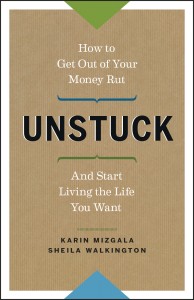UNSTUCK – How to Get out of Your Money Rut and Start Living the Life you Want
 by Karin Mizgala and Sheila Walkington
by Karin Mizgala and Sheila Walkington
(Excerpt from: Chapter 11 – Don’t Give Up on Retirement Yet)
It’s true that a lot of people are shying away from investing in RSPs, citing disappointing markets, big mortgage payments and newer TFSA options. Statistics Canada reports that almost 90% of tax filers were eligible to contribute to an RSP in 2010, but only 26% actually made contributions. Across Canada, the median contribution was $2,790.
In deciding whether or not it makes sense for you to invest in RSPs or TFSAs, here are some guidelines to consider:
Are you under the age of 50 and do you have 10 to 15 years left before you retire?
If the answer is yes, contributing to an RSP usually makes sense.
Are you in the highest income tax bracket?
For every dollar you contribute to your RSP in the highest tax bracket, you reduce your taxable income, in effect getting you a tax refund of $437 for every $1,000 you invest if you live in BC. (Tax rates vary slightly province to province.)
Do you have a pension plan?
If you have a pension plan through your employer, you may not be eligible to contribute much to RSPs and you may not need to if the pension meets your retirement needs.
Is the interest rate on your mortgage less than 4%?
If that’s the case, you may be better off putting the money into an RSP than using the funds to pay down your mortgage.
Do you have less than $200,000 invested in RSPs?
Even if you think you’ll work past 65 and your expenses are modest, you’re still going to need to save and invest for retirement (unless you have a defined benefit plan).
Is your income less than $40,000 a year?
If your income is less than $40,000, use a TFSA instead of an RSP. You can shift the money to an RSP later if your income increases. You get a tax break for making an RSP contribution but you are taxed on every dollar when you start taking money out. So you’ll want to make sure that you’re getting a high enough tax break on the money you contribute.
Is your income likely to be considerably higher in the coming years?
Perhaps you’re working part-time or you’re earning what amounts to a training wage while you work towards credentials that could boost your income. It makes sense to get the largest tax break you can for your RSP contribution, so as in the case above, put your money into a TFSA and wait until you can get a refund that’s ideally 30% or higher.
Does your employer benefit plan match RSP contributions?
Never say no to free money! If your company has any provision for matching RSP or pension contributions, take advantage of it.


